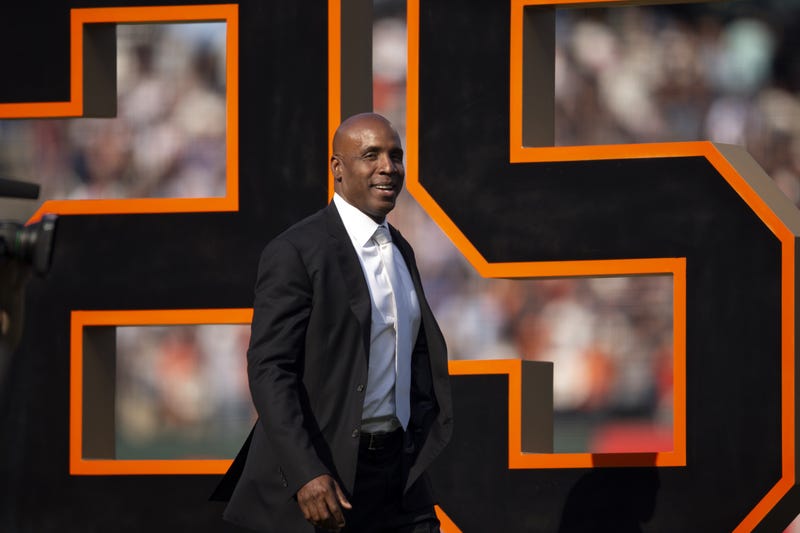
PITTSBURGH (93.7 The Fan) – The most polarizing figure in Pittsburgh sports history, baseball writers once again kept Barry Bonds out of the National Baseball Hall of Fame.
Bonds is the sports’ all-time home run king, yet got 66 percent of the vote, needing 75 percent to get in. Only David Ortiz (77.9%) was voted in with Roger Clemens getting 65.2 percent, Alex Rodriguez 34.3 percent in his first opportunity.

He covered Bonds during his career with the Pirates, long-time baseball writer John Perrotto says he was not surprised the class of 2022 turned out the way it did. The great players from the 90s didn’t get in because of Perrotto’s ballot. Perrotto voted for 10 players including Bonds, Clemens, Ortiz, Rodriguez, even the controversial Omar Vizquel.
“I vote off the record, not off what they did or didn’t do,” Perrotto said Tuesday. “Or what was suspected of what they did or what they might have done.”
Perrotto says while he understands the idea of a morality clause, but doesn’t believe it should affect votes.
“I’m not a moralist, I’m not God,” Perrotto said. “I don’t know who did what. You can have a pretty good idea of what guys did and didn’t do. I vote on them as players.”
“If someone would have had a capital offense, like a murder, then no I wouldn’t vote for someone like that. Beyond that, I’m a baseball writer. I don’t pretend to be something I’m not or more than what I am. I just vote for them on performance. I know some people agree with me and some who vehemently disagree. That’s how I’ve always done it.”
He's known Barry Bonds since he entered professional baseball. He’s seen every side of the seven-time MVP, but says there is a simple reason why he believes Bonds deserves to be in the Hall.
“I’ve been covering baseball for 34 years, it will be 35 this season,” Perrotto said. “To me he’s the best player I’ve seen and that includes Griffey, Trout and other guys. He was the best player. The best of them all, and he was that way before he got to San Francisco.”
“What he did or didn’t do once he got there, you can’t deny what he did (speaking of steroids). It happened, it’s a matter or record. To me he’s the best player I’ve seen in all of my years covering the game.”
For as great as he was on the field, he reputation off of it was as bad. Does Perrotto think, if Bonds was just nicer to his teammates, team employees, the media-that he would have been voted into the Hall?
“I do,” Perrotto said. “I think that would have bridged that nine percent that he fell short of. I hate for it to be that way, a popularity contest. I did see Barry be rude to people, there is no doubt. I’ve also seen him be tremendous to people.”
“One time he answered a question for 18 minutes about being the MVP in 1991. He could be engaging and very charming when he wanted to be.
“I asked him once when he was playing for the Pirates. I said ‘Barry, why don’t you just be half-decent to people? Even if you were just ok with the media and the fans, everyone would be eating out of your hands. You’re a great player. Why are you like that? He said ‘that’s just who I am, dude’.”
“That was Barry.”
Perrotto said he talked to Bonds while he was a coach with the Marlins. He said Bonds does regret not treating people better and just enjoying the game more when he was younger.
Perrotto doesn’t discount racism as a reason Bonds is not in, but he said it’s by far his link to steroids and ‘testy’ relationship with the media as the big reasons he’s not in. He said the fact Roger Clemens and others linked to ‘roids aren’t in as examples.
The Era Committee, formerly known as the Veteran’s Committee, will next be charged with the task of the validity of Bonds and others getting into the National Baseball Hall of Fame. They could vote them all in, some or none.
Sixteen make up the Era Committee-four former players, four former baseball executives, four baseball historians and four former baseball writers. The National Baseball Hall of Fame and Museum controls who those members are, so as Perrotto points out, they could stack the deck of the committee one way or another.
Not for the idea of an asterisk on records, Perrotto says a simple line on each plaque of Hall of Famers connected to steroids is a potential solution. He says you can’t just can’t ignore the stats or performances from that era. You can’t tell the whole story of baseball without Bonds, Clemens and others. You could tell it while also acknowledging what they did and the era they did it in.
One thing all can agree on.
“I could write 500 articles in a calendar year and no article would get more comments from readers—people on both sides,” Perrotto said of the story he writes explaining his ballot.
It also feeds the off-season machine of keeping baseball top of mind and for that there is no argument.
